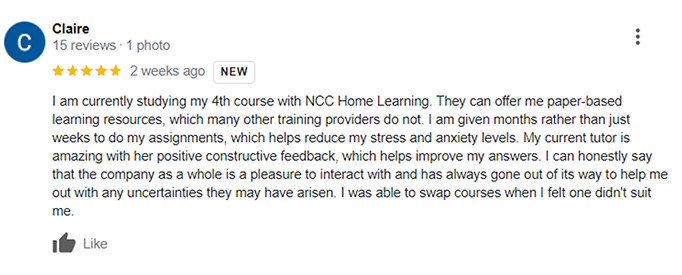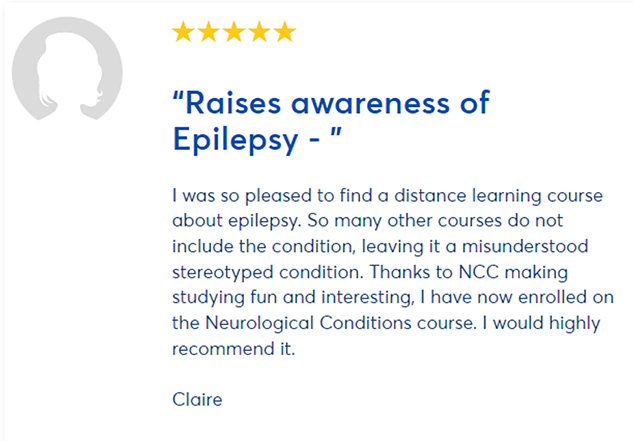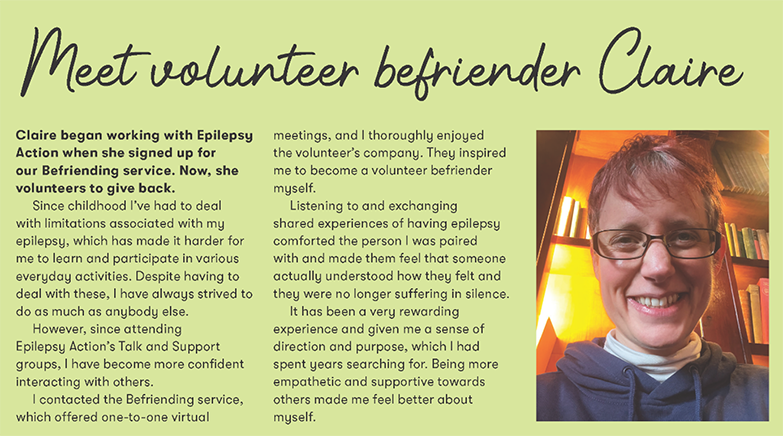Celebrating our learners’ achievements

At NCC, we take pride in our learners’ achievements, and we’re particularly thrilled to see how one learner has applied her educational journey to give back through volunteering. It’s truly inspiring to witness the impact she’s making, especially in her support for Epilepsy Action, a charity close to her heart. We wholeheartedly celebrate her dedication and the invaluable contribution she’s making to both her own growth and the welfare of others, alongside recognising the commendable efforts of Epilepsy Action.
Claire approached us following extensive research. She expressed her desire to undergo formal training in Understanding Epilepsy, aiming to attain an endorsed qualification along with a certificate as proof of her training. Claire is aware that while an endorsed qualification isn’t regulated, it can still serve as valuable evidence of acquired knowledge, potentially aiding in securing a spot in higher education. We’ve seen numerous learners utilise their endorsed qualifications from NCC to successfully gain admission to university.
Meet Claire an NCC learner

“I have learned about different people in society by studying courses online. Understanding people’s differences and learning how to adapt when interacting with them, can help eliminate the stereotypes and myths about different mental health conditions, neurological conditions, learning disabilities or specific learning difficulties and help remove any unnecessary anxieties that may be caused by misunderstanding. The more disability is shown in society, the more normal and accepted it can become. If people with disabilities separate themselves from the rest of society they become segregated, their conditions will remain stereotyped and misunderstood. NCC’s courses about Neurological Conditions and Understanding Epilepsy have been extremely interesting for me personally.
Understanding Epilepsy
Epilepsy is a neurological condition that today is still unfortunately too often stereotyped and doesn’t get enough awareness. Charities such as Epilepsy Action attempt to fill the gaps left by other services. The befriending service is led by trained volunteers who give up their spare time to support those who seek emotional support for whom traditional counselling or Cognitive Behavioural Therapy doesn’t work. Sharing experiences of having epilepsy can help someone feel more connected and understood. Befriending has given me a sense of purpose and direction, which has improved my mental wellbeing dramatically. Knowing that I have improved another person’s day purely by keeping them company for 30-45mins on the phone or video call is so rewarding. Being able to change my epilepsy from a negative experience into something positive has been made easier by Epilepsy Action’s volunteering opportunities, which I am always grateful for.
I am now studying QLS Level 2 Introduction to Counselling, in which I have learnt about listening skills and the advantages and disadvantages of different types of counselling and which has also been interesting and useful for my befriending role at Epilepsy Action. I am now wondering what future courses may be able to improve my skills even further. I do have an add-on course lined up called CPD Acquired Brain Injuries, which should complement the other courses well. I have come to the conclusion that I am naturally closer to a supporting, advisory role than a counselling, coaching role.”
Claire’s reviews
Claire has kindly provided a Google 5-star review of her experience with NCC:
NCC was the only distance learning company she could find offering a course designed for Epilepsy, an area frequently overlooked in disability training. Our collaboration with NCFE, a prestigious Awarding Organisation boasting over 150 years of educational support, enabled us to develop this specialised course.
This is what Claire had to say about studying “Understanding Epilepsy” with NCC:
The Benefits of Volunteering with Epilepsy Action
Volunteering alongside Epilepsy Action not only brings about positive change in the lives of individuals but also serves as a catalyst for personal development and overall well-being. According to their recent survey, an overwhelming 83% of volunteers reported feelings of personal accomplishment, heightened confidence, and fulfilment in their respective roles. For example, a research volunteer underscored how volunteering fosters a sense of belonging, bolsters confidence, and expands knowledge. Similarly, a Talk and Support Group volunteer emphasised the increase in self-assurance and skills as a direct result of their impactful contributions.
Additionally, numerous volunteers expressed that their involvement in volunteering activities is empowering and contributes significantly to their sense of self-value.
Volunteering offers avenues for skill development, meeting new people, and enhancing wellbeing. The diverse range of roles caters to various interests, schedules, and availabilities, whether it’s one-to-one support, group assistance, campaign involvement, or online awareness initiatives.
In addition to the personal benefits, Epilepsy Action is committed to supporting volunteers throughout their journey, ensuring they have the necessary resources to excel in their roles.

In today’s world, being a volunteer is really important for making society better. Whether it’s helping out locally or dealing with big global problems, volunteering is key. But it’s not just about lending a hand; it’s also about growing personally and learning new things. With online learning becoming more popular, people can use the internet to learn new skills, which can make their volunteering efforts even more effective.
Online Learning: Helping People Learn New Skills
Online learning has changed education a lot by offering loads of different courses on lots of topics. Whether you want to get better at technical stuff like coding or improve your communication and leadership skills, there’s a course for you. The great thing about online learning is that you can do it at your own pace, from anywhere, and fit it around your other commitments. Plus, there are different ways to learn, like watching videos, doing quizzes, or joining discussions.
Popular NCC Courses
Learning Skills for Volunteering
Online learning helps volunteers learn specific skills they need for their roles:
- Technical Skills: Knowing about technical stuff is important for many volunteering projects, like making websites or analysing data. Online courses in programming, web development, and design can help volunteers become experts.
- Communication and Leadership: Good communication and leadership are crucial for volunteering. Courses on speaking in public, solving problems, and managing teams teach volunteers how to express themselves, work with others, and lead projects.
- Understanding Different Cultures: In a diverse world, it’s important to understand different cultures when volunteering. Online courses on cultural diversity and inclusion help volunteers connect respectfully with different communities.
- Disability Awareness: Knowing about disabilities helps volunteers include everyone. Disability training teaches volunteers how to accommodate different disabilities and be respectful and understanding. This makes volunteering opportunities open to everyone and makes the experience better for both volunteers and those they help.
- Project Management: Being good at managing projects is important for successful volunteering. Online courses teach volunteers the skills they need to plan and carry out projects effectively.
When volunteers combine this extra training with their hands-on experience, it can really help them in their careers and open up more opportunities.
Making a Difference through Volunteering
By using online learning, volunteers can learn skills that make a real impact. Whether they care about protecting the environment or fighting for fairness, online learning helps volunteers connect with communities and make positive changes. Well-trained volunteers also make volunteering projects more successful, which leads to lasting change and a better society for everyone.
Online learning is a powerful way to improve volunteering and create social change. By learning new skills through online courses, volunteers become better at what they do and can tackle important issues, making the world a better place. Let’s use online learning to support volunteers and make our communities stronger.
The Impact of Disability Awareness in the Wider Community
Every day, individuals with disabilities that are not immediately visible often face the challenge of dealing with misconceptions and discrimination. This was highlighted in a recent article I came across, where a person with cerebral palsy was mistaken for being intoxicated. However, by fostering greater awareness and understanding of disabilities, La Quinta management has set a remarkable example of what inclusivity can achieve. Their efforts have not only created a welcoming environment for members of the community with disabilities, significantly enhancing their mental health and well-being, but it also undoubtedly benefits their business. Building a more inclusive community can only lead to positive outcomes.
The article in question is: The Essex restaurant that transforms into a nightclub for people with disabilities every week
This article and its content have been approved by the charity Epilepsy Action
Social media is a powerful platform in many ways. But just as it can be used for positive gain, it can also quickly turn into an uncontrollable monster.
For students and tutors alike, harnessing the power of the digital world as part of a course is now part and parcel of delivering vibrant learning experiences.
However, social media should not be included in course material and student’s learning solely because it is the ‘modern thing to do.’ It needs to enhance a student’s learning and contribute to improving their learning outcomes. If these conditions are met, it can be a welcome and useful part of a teaching practice.
So, how can tutors and learners grasp the sometimes-thorny issue of social media in learning?

Most learning providers suggest that staff and students create accounts that are specifically for professional use so that personal accounts are not compromised.
#1 Include it in course details, syllabus and description
Some students and tutors are ‘frightened’ or wary of social media. It can be an unruly beast, and for some worry that their profiles could be vulnerable to attack or hijacking.
This is why online learning providers who do use social media include this detail in course descriptions and their syllabus, offering additional support to students who need to create online profiles.
Social media is not just about updating your Facebook status or tweeting as a contribution to a discussion. Some course providers are also harnessing the power of open blogging sites (such as Blogger) to publish work and facilitate discussion over certain texts.
There also need to be options for students who are not willing or able to share in the social media aspects of the course.
#2 Contracts and permissions
Social media (including blogging sites) are public mediums, and this means that students need to be prepared to use them correctly. Signing a contract between student and tutor on how these platforms will be used is essential.
Encourage students to use aliases if this makes them feel more comfortable. You should also create guidelines that help them stay safe when online, and add to these guidelines as and when experience dictates. Ask students to contribute to these guidelines.
#3 Link to institutional policies
Learning providers will often have policies relating to the use of social media sites in terms of what can and cannot be used and/or shared. These are important policies that are put in place to protect the institution, its reputation, staff and students.
Both students and tutors need to be aware of the disciplinary process, as online abuses can have far reaching consequences.
#4 Safety
Mentioned in a previous point, you can encourage students and tutors to use an alias to protect their identity and the integrity of their work. These aliases need to be appropriate, but also communicate throughout the group so that students and tutors can identify each other online.
There are also some social media sites that allow ‘member only’ access, and this is a useful additional security filter.
#5 Teach responsible social media use
On a personal level, we all think we know how to deal with social media, but the ways in which people interact differs from person to person.

Social media is not just about updating your Facebook status or tweeting as a contribution to a discussion.
In ‘real life’, people argue, and social media is no different. Interactions can be tense and exchanges short and terse. Posts and words can be published ‘without a filter,’ with no regard to whether the content could offend, or whether it is appropriate or not.
As well as appropriate and responsible use, there is also the consideration needed of whether sharing some works online is legal. Students and tutors need to understand the Creative Commons licence and how it applies to other people’s work and their own.
#6 Not to be used for feedback
Student feedback (and vice versa) should be given via the learning management portal, and not via open or closed-group social media sites.
#7 Create learning accounts
Students and tutors may have a whole plethora of personal social media accounts. Most learning providers suggest that staff and students create accounts that are specifically for professional use, so that personal accounts are not compromised.
#8 Consider whether it is the best platform
Social media platforms and channels will all have differing Terms of Service. Consider these carefully, because if service is discontinued, your students work will be lost. As with all technology, always have a Plan B.
Online Courses, Learning and Teaching
Online courses and distance learning have gained momentum in recent years. There is now a wide-range of courses available to the home learning student, from online marketing courses to beautician courses, psychology courses and more.
How do you think social media can be used to enhance your learning?
